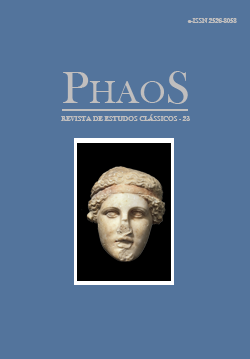Resumo
Neste texto discutem-se alguns tópicos do Herácles de Eurípides em paralelo com a Olímpica 12 de Píndaro, tendo em vista que esta guarda notáveis pontos de contato com o enredo e alguns temas dessa tragédia. O objetivo principal da discussão é mostrar uma característica marcante do Héracles, a utilização de formas poéticas e temas típicos de outros gêneros líricos, sobretudo do epinício, pouco produtivo na época de composição dessa tragédia, mas que teve em Héracles um de seus heróis pan-helênicos mais recorrentes.
Referências
BARRETT, W. S. Pindar’s twelfth Olympian and the fall of the Deinomenidai. Journal of Hellenic Studies v. 93, p. 23-35, 1973.
BOND, G. Euripides: Heracles. Clarendon: Oxford, 1981.
BRANDÃO, J. L. A (des)construção do herói (o problema da mediação no Héracles de Eurípides). Ensaios de literatura e filologia, v. 5, p. 113-75, 1987. Disponível em: https://periodicos.ufmg.br/index.php/literatura_filologia/issue/view/420. Acesso em: 1 ag. 2023.
BREMER, J. M. Euripides Heracles 581. Classical Quarterly, v. 22, p. 236-40, 1972.
CAREY, C. The victory ode in the theatre. In: AGÓCS, P.; CAREY, C.; RAWLES, R. (orgs.) Receiving the komos: ancient and modern receptions of the victory ode. London: Institut of Classical Studies, 2012, p. 17-36.
CURRIE, B. Pindar and the cult of heroes. Oxford: Oxford University Press, 2005.
DIGGLE, J. Euripidea. Oxford: Oxford University Press, 1994.
DHUGA, U. S. Choral identity and the chorus of elders in Greek tragedy. Lanham: Rowman & Littlefield, 2011.
EGLI, F. Euripides im Kontext: Zeitgenössischer intellektueller Strömungen. Analyse der Funktion philosophischer Themen in the Tragödien und Fragmenten. München/Leipzig: Saur, 2003.
ERBSE, H. Studium zum Prolog des euripideischen Tragödie. Berlin: de Gruyter, 1984.
FINGLASS, P. J. Sophocles: Ajax. Cambridge: Cambridge University Press, 2011.
FORD, A. Linus: the rise and fall of lyric genres. In: FOSTER, M.; KURKE, L.; WEISS, N. Genre in archaic and classical Greek poetry: theories and models. Leiden: Brill, 2019, p. 57-81.
FRADE, G. A Olímpica 12 de Píndaro: tradução e comentário. Nuntius antiquus, v. 8, n. 1, p. 129-42, 2012. Disponível em: https://periodicos.ufmg.br/index.php/nuntius_antiquus/article/view/17221. Acesso em: 1 ag. 2023.
FRANCISCATO, C. R. Eurípides: Héracles. São Paulo: Palas Athena, 2003.
GENTILI, B. et al. Pindaro: Le Olimpiche. Milano: Lorenzo Valla, 2013.
GERBER, D. E. Euterpe. Amsterdam: Hakkert, 1970.
GRETHLEIN, J. Asyl und Athen: die Konstruktion kollektiver Identität in der griechischen Tragödie. Stuttgart/Weimar: Metzler, 2003.
HENRICHS, A. Dancing in Athens, dancing on Delos: some patterns of choral projection in Euripides. Philologus v. 140, p. 48-62, 1996.
HUNTER, R. Critical moments in classical literature: studies in the ancient view of literature and its uses. Cambridge: Cambridge University Press, 2009.
KROEKER, E. Der Herakles des Euripides: Analyse des Dramas. Giessen: Tese de doutorado, 1938.
KURKE, L. The traffic in praise: Pindar and the poetics of social economy. Ithaca: Cornell University Press, 1991.
MASTRONARDE, D. J. Euripides: Phoenissae. Edited with introduction and commentary. Cambridge: Cambridge University Press, 1994.
NICHOLSON, N. J. The poetics of victory in the Greek West: epinician, oral tradition, and the Deinomenid empire. New York: Oxford University Press, 2015.
NISETICH, F. J. The leaves of triumph and mortality: transformation of a traditional image in Pindar’s Olympian 12. Transactions of the American Philological Association, v. 107, p. 235-64, 1977.
PAPADOPOULOU, T. Heracles and Euripidean tragedy. Cambridge: Cambridge University Press, 2005.
PARRY, H. The second stasimon of Euripides Heracles (637-700). American Journal of Philology, v. 86, p. 363-74, 1965.
PORTER, J. I. The sublime in antiquity. Cambridge: Cambridge University Press, 2016.
PUCCI, P. Euripides’ revolution under cover: an essay. Cornell: Cornell University Press, 2016.
RACE, W. H. Elements of plot and the formal presentation in Pindar’s Olympian 12. Classical Journal, v. 99, p. 373-94, 2004.
SILK, M. Pindar’s poetry as poetry: a literary commentary on Olympian 12. In: HORNBLOWER, S.; MORGAN, C. (orgs.) Pindar’s poetry, patrons, and festivals: from archaic Greece to the Roman empire. Oxford: Oxford University Press, 2007, p. 177-98.
STROHM, H. Tyche. Stuttgart: J. G. Cottasche, 1944.
SWIFT, L. The hidden chorus: echoes of genre in tragic lyric. Oxford: Oxford University Press, 2010.
TELÒ, M. Archive feelings: a theory of Greek tragedy. Columbus: The Ohio State University Press, 2020. Disponível em: file:///C:/Users/crtwe/Downloads/Telo_11-3_9780814280812_OA%20(1).pdf. Acesso em: 1 ag. 2023.
THEUNISSEN, M. Pindar: Menschenlos und Wende der Zeit. München: Beck, 2000.
THUMMER, E. Die Religiosität Pindars. Innsbruck: Universitätsverlag Wagner, 1957.
TORRANO, J. Eurípides: teatro completo. Vol. 2. São Paulo: Iluminuras, 2016.
VERDENIUS, W. J. Commentaries on Pindar. Volume I. Leiden: Brill, 1987.
WEISS, N. Generic hybridity in Athenian tragedy. In: FOSTER, M.; KURKE, L.; WEISS, N. (org.) Genre in archaic and classical Greek poetry: theories and models. Leiden: Brill, 2019.
WERNER, C. Andrómaca de Eurípides: El prólogo y la noción de unidad en la Poética de Aristóteles. Synthesis, v. 22, p. 1-19, 2015. Disponível em: http://www.scielo.org.ar/pdf/synth/v22/v22a05.pdf. Acesso em: 1 ag. 2023.
WERNER, C. Memórias da Guerra de Troia: a performance do passado épico na Odisseia de Homero. Coimbra: Imprensa da Universidade de Coimbra, 2018.
WERNER, C. Caracterização e discurso na tragédia grega: o ancião e a esposa no prólogo do Héracles de Eurípides. Códex, v. 8, n. 1, p. 224-41, 2020. Disponível em: https://revistas.ufrj.br/index.php/CODEX/article/view/33631. Acesso em: 1 ag. 2023.
WILAMOWITZ-MOELLENDORFF, U. Euripides Herakles. Vol. 3. 2ª ed. Berlin: Akademie, 1959.
WILAMOWITZ-MOELLENDORFF, U. Pindaros. Berlin: Weidmann, 1966.
WILSON, P. Euripides’ tragic Muse. In: CROPP, M. et al. (org.) Euripides and tragic theatre in the late fifth century. Illinois Classical Studies, v. 24-25. Champaign: Stipes, 1999-2000, p. 427-50.

Este trabalho está licenciado sob uma licença Creative Commons Attribution-NonCommercial-ShareAlike 4.0 International License.
Copyright (c) 2023 Creative Commons


